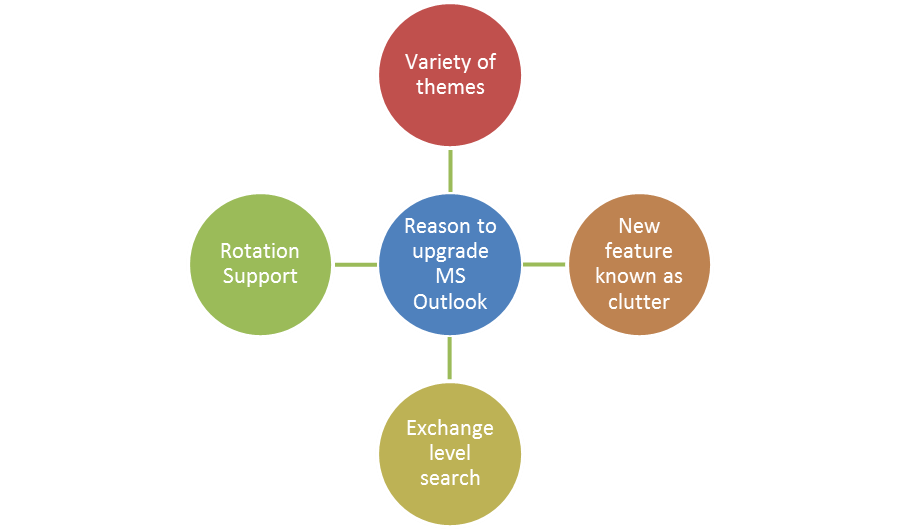
Manage contacts and make notes

Schedule your meetings

Manage different accounts on MS Outlook

Understand about Clutter which will help to manage inbox
As we know in this modern era Email has become one of the most frequently used methods of communication, whether it is used for personal, business or Professionally communications. It doesn’t matter whether you are working in a large or small organisation, email is the most preferred form of communication among the employees.
Nowadays many organisation has decided to implement corporate mail management system for, e.g., Outlook to communicate and organise meetings. It will also help to share your calendar and contacts with others.
Microsoft Outlook training is planned for delegates who have very less knowledge of the Microsoft Outlook 2016 users who want to learn the concepts covered in this course in the 2016 interface. Microsoft has added a new feature in the Outlook known as Clutter it moves emails that users ignored to Clutter to keep the Inbox clean.
Delegates will use Outlook to manage your email communications, including write, manage contact information; read, and respond to emails; schedule appointments and meetings; schedule tasks and create notes; customise message response options, and organise your mail. MS Outlook 2016 also provides different fonts for Arabic as well as Western European languages. This course will provide delegates with the knowledge and skills necessary to be a proficient user.

What is Microsoft Outlook Training?
Microsoft Outlook 2016 provides better organisation, social networking features, search capabilities, and communication. With this Microsoft Outlook 2016 training course, you will learn the four major components of Outlook including contacts, email, calendars and tasks that make things easy for users.
Why Should I take Microsoft Outlook Training?
This Outlook training is suitable for those delegates who want to upgrade their knowledge related to MS Outlook 2016, so they can compose and send, manage personal tasks, scheduling of meetings, and make notes.
Delegates will learn to customise a different set of command, manage different mail accounts, make rules to automate the variety of tasks, set different global options, attach files, check spelling. Apply filters to intercept mail and control spam, manage tasks, handle calendars and contacts, and archive data to protect it.
What are the benefits of Taking Microsoft Outlook Training?
Delegates will learn tasks such as:
Why choose Pentagon Training?
Pentagon Training is known as the best training Provider in all domains.Our instructors are certified and experienced so that delegates will not get difficulty during the course. Pentagon training is one of the most leading training providers of this training due to its high-quality content. It is most trusted by professionals and industry leading brands. Our well trained and experienced instructors teach that what is required by industry.
Enquire Now
----- OR -------
Reach us at +44 1344 961530 or info@pentagonit.co.uk for more information.
Carlisle, a city in Cumbria, is also the managerial centre of the City of Carlisle region in North West England. It is the main settlement in the county of Cumbria and helps as the managerial centre for both Carlisle City Council and Cumbria County Council. At the time of the 2001 survey, the population of Carlisle was 71,773. In 2011, the city's population had increased to 75,306, with 107,524 in the wider city.
The early history of Carlisle is noticeable as a Roman payment, recognised to serve the forts on Hadrian's Wall. In the Middle Ages, because of its nearness to the Realm of Scotland, Carlisle industrialised meaningfully. The armed stranglehold, Carlisle Castle, was built in 1092 by William Rufus, and once added as a custodial for Mary, Queen of Scots. The castle now relatives the Duke of Lancaster's Regiment and the Border Regiment Museum. In the 12th century, Henry I allowed the building of a priory in Carlisle. The town produced the rank of a city when its diocese was formed in 1133, and the cloister industrialised Carlisle Cathedral.
Governance:
Carlisle has detained city status since the Middle Ages. Also, it kept its status as an area constituency or governmental borough for centuries, at one time returning two MPs. In 1835 it became a municipal borough and was later upgraded to a borough status in 1914. The city's boundaries have changed several times since 1835 the final time in 1974.
The municipal area surrounded many parts of parishes which were combined into a single civil parish of Carlisle in 1904. The currently present urban area is considered as an unparished area. Carlisle had in 2002 made an unsuccessful attempt to grow to a Lord Mayoralty. An iconic building that stands tallest in Carlisle may be demolished, and the area nearby to it rehabilitated.
Climate:
Carlisle practices an oceanic climate. In January 2005 Carlisle was hit by strong wind storms and torrential rains. On Saturday 8 January 2005 all roads into Carlisle were shut owed to severe flooding, the worst since 1822, which produced three deaths. Less severe but still significant flooding occurred in 2009, but due to Storm Desmond. Carlisle experienced even worse flooding than 2005 between Friday 4 and Sunday 6 December 2015. During this time, nearly 36 hours of nonstop precipitation broke flood defences. This left several areas submerged including Bitts Park, Hardwicke Circus and Warwick Road. This left the famous Sands Centre, stranded from the rest of the city. As several other areas of Cumbria were also severely pretentious, all trains to Scotland were postponed forever. The trains on the West Coast Principal went no further than Preston. Prime Minister David Cameron stayed the city on 7 December 2015 to measure the damage.
We are offering more than 250 courses at 91 locations in UK.